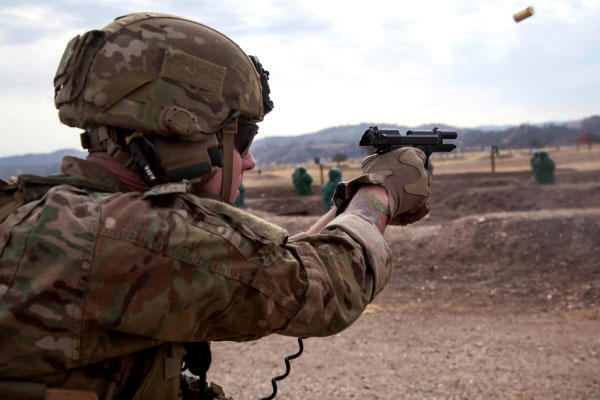The U.S. Army's plan to replace the M9 9mm pistol could result in the large-scale adoption of hollow-point pistol ammunition -- a move the U.S. military has refused to even consider for more than 100 years.
The Pentagon's devotion to full-metal jacket, or ball ammunition, is the result of a 116-year-old guideline in the 1899 Hague Convention that prohibits combat units from using bullets that "expand or flatten easily" inside the human body.
The declaration was ratified by all major powers, except the United States, but the Pentagon has used it as the legal standard to rule out any ammunition other than ball for use in sidearms.
This mindset is changing, however, since the recent release of the Army's draft solicitation for the Modular Handgun System cites a new Defense Department policy that allows for the use of "special purpose ammunition."
"Federal, state, local and military law enforcement elements routinely use expanding and fragmenting ammunition in their handguns due to the increased capability it provides against threats," Program Executive Office Soldier spokeswoman Debi Dawson told Military.com.
The policy was discussed at the fourth MHS industry day held recently at Picatinny Arsenal, N.J., according to Dawson in a news release.
"Expanding the XM-17 Modular Handgun competition to include special purpose ammunition will provide the warfighter with a more accurate and lethal handgun," Richard Jackson, Special Assistant to the U.S. Army Judge Advocate General for Law of War, told attendees according to the release.
In the past, specialized ammunition approval has been granted only if the requirement passes a legal review. This means that the military has had to get creative at times when it describes what it needs.
Tier-1, special-mission units under U.S. Special Operations Command are authorized to use jacketed hollow-point bullets instead of standard ball. To do this, these elite units had to be classified as counterterrorism forces, a legal distinction that allows them to use the same hollow-point ammo used by all law enforcement agencies.
Army weapons officials plan to open the official competition next year with the goal of awarding a contract to a single gun maker for nearly 300,000 new pistols by 2018.
One of the major goals of the MHS effort is to adopt a pistol chambered for a more potent round than the current 9mm, weapons officials said. The U.S. military replaced the .45 caliber 1911 pistol with the M9 in 1985 and began using the 9mm NATO round at that time.
Related Video
Soldiers who have served in Iraq and Afghanistan have complained that the 9mm round is not powerful enough to be effective in combat, Army officials said.
But experts from the law-enforcement and competitive shooting worlds have argued that tactical pistol ammunition – no matter the caliber -- depends on proper shot placement to be effective at stopping a determined adversary.
The Army began working with the small arms industry on MHS in early 2013, but the effort has been in the works for more than five years. If successful, it would result in the Defense Department buying more than 400,000 new pistols during a period of significant defense-spending reductions.
MHS is set to cost at least $350 million and potentially millions more if it results in the selection of a more potent pistol caliber, sources said.
Current plans call for the Army to purchase more than 280,000 handguns from a single vendor, with full rate production scheduled for 2018. The Army also plans to buy approximately 7,000 compact versions of the handgun. The other military services participating in the XM17 program may order an additional 212,000 systems.
-- Matthew Cox can be reached at matthew.cox@military.com




























